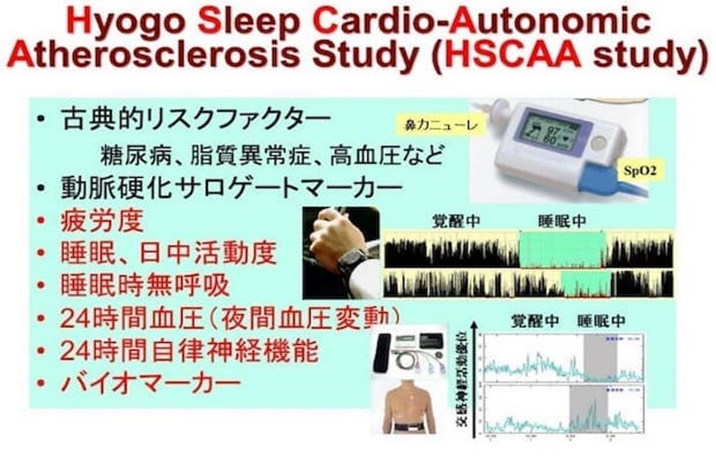Research into biological stress responses caused by lifestyle factors such as sleep, fatigue, and autonomic nervous function (Hyogo Sleep Cardio-Autonomic Atherosclerosis Study: HSCAA Study)
Information updated: July 31, 2023
- Seeds Information
- Researcher Information
- What do you expect from collaboration with companies?
- Contact for this research
Seeds Information
keyword
睡眠時無呼吸、睡眠の質、疲労、自律神経機能
Field
生活習慣病、心・腎・代謝機能、心血管イベントに関わる研究
Overview
日々の睡眠や疲労度、日中活動度、自律神経機能を客観的、網羅的に評価し、内分泌・代謝疾患をはじめ、心・腎・代謝機能、心血管イベントの有無を追跡し、睡眠や疲労、自律神経機能障害など生体ストレスの意義を明らかにすることを目的とした Hyogo Sleep Cardio-Autonomic Atherosclerosis(HSCAA) コホート研究を2010年から実施している。
2025年末時点で約1,200人の患者が登録され、平均3.6年の追跡を受けている。
これまでに、睡眠の「質」の低下がインスリン分泌能及び感受性低下と関連すること(Kakutani-Hatayama M, et al. Metabolism Open 2020)、自律神経機能が左室拡張能と関連すること(Morimoto A, et al. Metabolism Open 2020)、腎機能障害を有していない糖尿病患者での睡眠の「質」の低下及び自律神経機能障害の腎機能悪化のリスクについて報告した(Kadoya M, et al. Sci Rep 2021)。
最近では、睡眠時無呼吸や睡眠の質の低下が将来の心拡張機能低下のリスクとなること(Kidawara Y, et al. JAHA 2022)、糖尿病患者において睡眠と強く関連する夜間高血圧が心拡張機能低下のリスクとなること(Kidawara Y, et al. Hypertension 2024)を相次いで報告している。
What's new?
日々の睡眠や疲労度、日中活動度、自律神経機能を客観的、網羅的に評価し、内分泌・代謝疾患をはじめ、心・腎・代謝機能、心血管イベントの有無を追跡し、これらに対する睡眠や疲労、自律神経機能障害など生体ストレスの意義を明らかにする点。
What are its advantages over other studies?
本コホート研究では、多くの登録患者(約1200名の患者)による長期間の追跡データを保有しているため、種々の解析に応用可能である。
1, 睡眠時無呼吸や睡眠の質、自律神経機能の他覚的な評価によるデータ
2, 長期間(平均3.7±2.7年)の追跡データ
What problem does it help solve?
本コホート研究で取得したデータを解析すれば、心・腎・代謝機能の変化、心血管イベントの発生を予測するバイオマーカーが見出される可能性がある。
さらに、睡眠や自律神経機能などの生活関連因子のデータは予防医学という観点からも使用することが可能で、様々な健康リスク評価ツールの開発へつながる解析も可能である。
Possibility of other applications and developments
睡眠・ストレスといった切り口からの新たな商品開発の可能性がある。
働き方の多様化、デジタル化に伴う生活環境の変化から、近年では特に「睡眠」の重要性が認識されるようになっており、この視点から将来の健康を維持するための商品開発を後押しできる可能性がある。
Related Patents
―
Related papers
Researcher Information
| full name | Hidenori Koyama |
|---|---|
| Affiliation | School of Medicine Department of Diabetes Endocrinology and Clinical Immunology |
| Specialization | 生活習慣病、心・腎・代謝機能、心血管イベントに関わる研究 |
| Collaborative Researcher | Manabu Kakutani |
| Related links | Laboratory website |
What do you expect from collaboration with companies?
良好な生活関連因子の維持を目指すことは、結果として様々な代謝疾患や心腎機能の維持に貢献できる可能性あり、予防医学という観点からも良好な睡眠の維持や疲労軽減関連の製品に付加価値をつけることができ、社会的インパクトも大きくなる可能性がある。
生活関連因子がもたらす効果についてのメカニズムはまだまだ未解明な部分も多く、並行して当科で実施している基礎研究とも絡ますことができれば、新たなサロゲートマーカーの確立などを目指せる可能性も秘めており、このサロゲートマーカーを利用した新たな医療機器の開発にも道筋をつけることができるかもしれない。
Contact for this research
兵庫医科大学 大学事務部 研究推進課
E-mail: chizai@hyo-med.ac.jp
Tel: 0798-45-6488

 Research Seeds Collection
Research Seeds Collection
